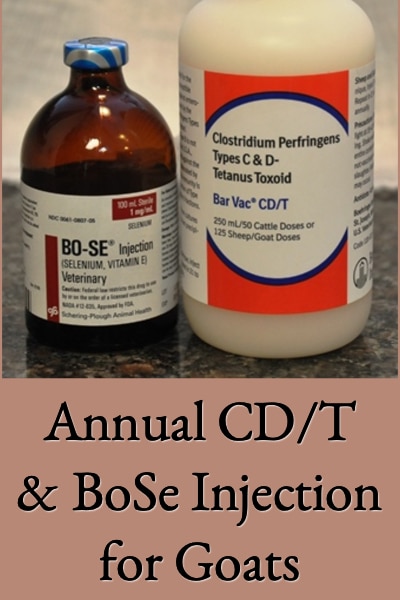
The CD/T injections are usually combined into one shot and are given to prevent enterotoxemia (the CD part) and tetanus (the T part). BoSe shots are administered to prevent selenium deficiency for goats living in selenium-deficient areas of the country.
Here are the basics to know about these vaccinations for goats (skip to the last paragraph if you don’t want to know all the details (restrictions) on drugs for food-producing animals):
What Do These CD/T & BoSe Injections for Goats Do?
The CD/T shot is made up of:
Tetanus toxoid – provides long term protection against tetanus (deadly if untreated) which is caused when a wound becomes infected with tetanus bacteria (these bacteria live in all soil).
Enterotoxemia vaccination – enterotoxemia is a condition where bacteria that are normally present in the goat intestinal tract grow uncontrollably.
It occurs when movement of food through the intestines slows because of overeating of grain, spring pasture, milk, or milk replacer. It often occurs in spring after goats bloat from eating too much new spring growth and is commonly referred to as “overeating” disease (also deadly if untreated).
BoSe – this is a selenium and vitamin E booster commonly given to goats residing in selenium-deficient areas. It is necessary to maintain muscle tone in adults and prevent “white muscle disease” in kids.
Where Do You Obtain CD/T & BoSe Injectables?
In order to answer this, you need to know about drugs for food-producing animals:
There are two categories of drug types:
Over-the-Counter (OTC): Available without a prescription and can be found at animal or farm supply stores/on-line.
Prescription (Rx): Used when a proper diagnosis and special instructions are needed. Rx drugs are restricted by federal law to use by or on the order of a licensed veterinarian (these drugs can be purchased from an animal supply store, but must have a copy of a veterinarian’s prescription).
And there are three categories of drug usage (and these pertain to both OTC and Rx drugs):
Legal: Owner follows ALL directions on the label of the medication.
Off-label: Owner deviates from label direction in any way. Off-label use of drugs is ALWAYS illegal!
Extra-Label Drug Use (ELDU): Under direction from a licensed veterinarian and owner may deviate from label directions.
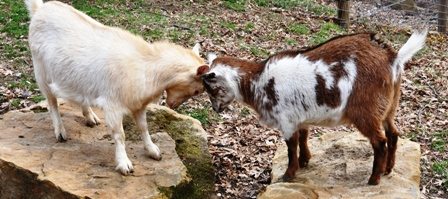
Playing Goats
ELDU occurs any time that
1) a non-approved product is used;
2) an approved product is used in a way that differs from the label, or
3) a product is used for a condition not specified on the label.
For ELDU, there must be an established Veterinarian-Client-Patient Relationship (VCPR), determined by:
1) veterinarian has seen the animal or others in the same herd and can make decisions regarding an animal’s treatment;
2) client follows the treatment instructions;
3) the veterinarian calculates a reasonable withdrawal time, and
4) the veterinarian is available for follow-up.
The distinctions for ELDU are important because most of the products developed and labeled for livestock have not been tested on goats and have not been FDA-approved for use. Because of the small number of goats in the US, most companies can’t justify the costs required to test their products on goats, so using them legally falls under “ELDU” requirements.
The bottom line, for enterotoxemia, the vaccine is often combined with the tetanus toxoid and is called a CD/T vaccine. You should be able to find this on-line at animal supply vendors or place like Tractor Supply, but the BoSe is an Rx drug – so you need a prescription from the vet (for convenience the vet can usually supply both).
How Should CD/T & BoSe Injections Be Administered?
The label should indicate that one of the three methods below (if both IM and SQ are given as acceptable methods, it’s generally given to goats SQ) should be used for the injection:
Intramuscular (IM): Given deep into the muscle. Generally a needle length of 1” to 1 ½” and gauge of 18 to 20 is used (the larger the gauge, the finer the needle). Drugs administered IM absorb faster that SQ but slower than IV.
Subcutaneous (SQ or subQ): Given under the skin. Needle length of ½” to 1” and a gauge of 18 to 20 is used. Use the “tent” method by pulling up the loose skin in the area of the injection site. Holding the syringe and needle parallel to the body, push the needle through one layer of the skin and administer the medicine into the cavity created by the “tent”.
Intravenous (IV): Administer medication into the vein. It’s sometimes difficult to locate the vein, and this method is not recommended for inexperienced owners.
The normal dosage (per our Vet) for both BoSe and CD/T is 2 cc for each adult injected subcutaneously. See Giving Goats Injections for more on administering drugs to goats via a shot.
CAUTION: One thing to always have on hand when giving goats injections is epinephrine. It can save a goat if it goes into anaphylactic shock from an injection (dosage is 1 cc per 100 lbs.). It’s an Rx drug and is one of the few drugs that are not good beyond its expiration date, and a new bottle is necessary every year (store it in the refrigerator).
If a goat does go into shock, there’s no time to go get the epinephrine, so always have it on hand with a fresh needle and syringe.
The CD/T annual injection is generally recommended for all adult goats, while the BoSe injection is recommended for goats in selenium-deficient areas and may be needed more frequently than annually (consult with your vet). We now administer Bo-Se more frequently to prevent selenium deficiency. The recommendations for these drugs for goat kids are different and are covered in other posts on this site.
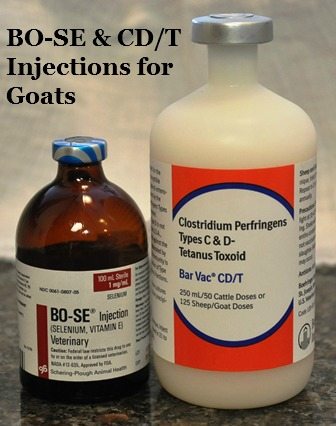
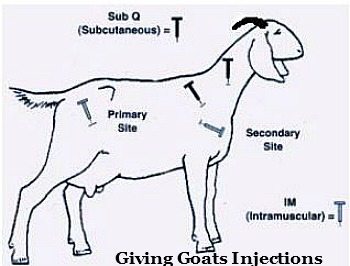
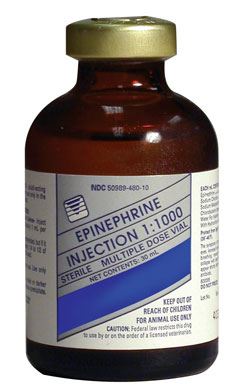
Cooray says
I’m from Srilanka i have small goat farm. For thanks your helps. God bless.
Lesa says
Hi Cooray, Happy to hear from Srilanka and that it’s helpful!
kandy says
I had a 3 month old boer doe goat die…she was crying when i found her… she was healthy i thought. Always playing & running around…i was wondering if a bigger goat could have hurt her…we have only been in goats for 3 yrs..4H projects…thanks…Kandy
Stephen Kratzer says
Thanks for the information. It is very clearly presented. Could you add details on when/how often to administer each?
Lesa says
Hi Stephen, for the CD/T, we administer the shot 4 weeks before the does are due to freshen each year, and then give the kids their first shot at 4 weeks and a second at 8 weeks. Then we give it to them annually. So, our goat kids get immunity passed from their dams because we gave the does their annual shot 4 weeks before they freshen, then the kids get their initial and booster shots, and then they get an annual shot.
For BoSe, I was told by our Vet to use 2 cc annually. However, the amount of selenium deficiency varies widely depending upon your area of the country, and we have increased our usage. We now administer 1 ml/40 lbs of weight, and are doing it at least prior to breeding season, 30 days before does freshen, and in the summer. If kids seem weak at birth we will administer up to 1/2 ml SQ. We usually start with less than that and work up. When they are a month old then I will start them on the BoSe at the 1 ml/40 lbs and am trying to make sure that we are doing it at least 3 times per year. For the BoSe, it will depend on your area and you should talk with your vet/county extension agent/other goat breeders, etc. as well as examine your goats regularly to find out what works best for you. Hope this helps.
Ram says
Hi its ram frim india started goat keeping from last 2 years ,we are facing issues with kids,I mean kid mortality,as thry r weak by birth,so I decided to go for bose to biist immunity coul u plz help me more on this?
Lesa says
Hi Ram,
What is it that you’re wanting more help on?